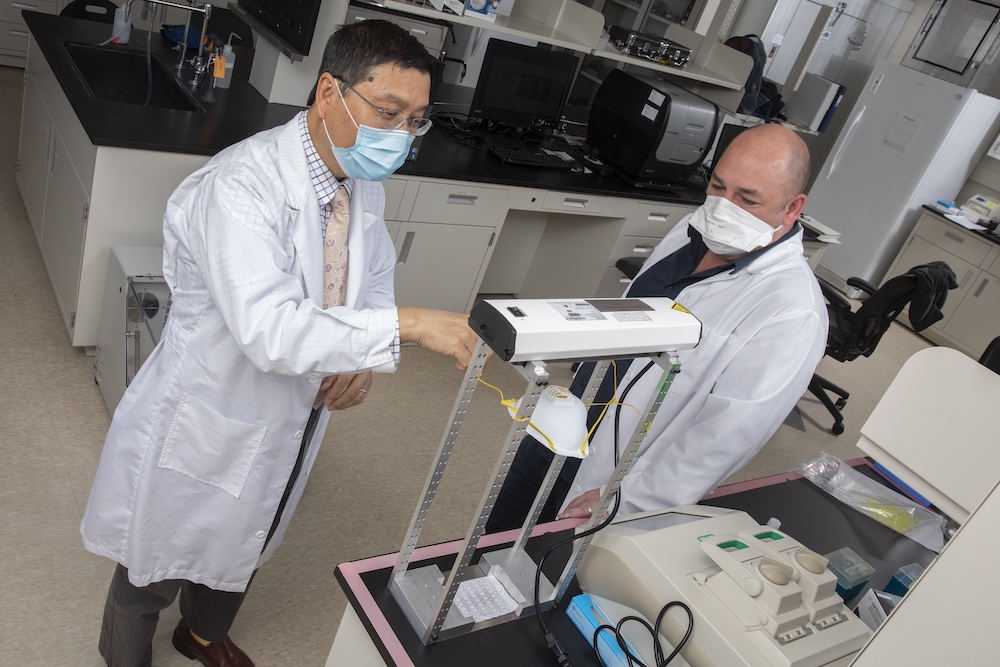Binghamton University awarded SUNY Prepare Innovation Grants to pursue COVID-19 research

BINGHAMTON, NY—The State University of New York has awarded grants to three teams at Binghamton University to pursue research projects related to COVID-19 as part of its new Prepare Innovation and Internship Program.
“It is a great privilege for our students and faculty to have the opportunity to pursue these projects, which could help protect the people of New York state and beyond,” said Binghamton University President Harvey Stenger. “That three of our projects were selected shows how innovative and big-thinking our students and faculty are, and we are excited to see what our teams can accomplish.”
While COVID-19 vaccines are now being given to medical personnel fighting at the frontlines of the pandemic, personal protective equipment (PPE) and other healthcare protocols will continue to be necessary to contain the virus in the coming months and other infectious diseases in the future. As a way to develop state-of-the-art PPE and improve effective safety interventions, State University of New York Chancellor Jim Malatras announced awards from the SUNY Prepare Innovation and Internship Program. A total of 12 teams of SUNY students and faculty across seven campuses received up to $10,000 each in seed funding to conduct further research on their proposals. The program is designed to provide real-life, hands-on applied learning experiences for students, and actively involve them in the creation of pandemic-related solutions.
The winning proposals range from developing new antiviral surface sanitizers for college campuses and other facilities to creating a low-cost surgical mask that has the filtration efficiency of an N95 respirator while maintaining airflow for individuals with respiratory issues.
“From day one, SUNY has been leading the effort to combat COVID-19 with providing frontline healthcare workers PPE, like face shields using innovative 3D printing technology, developing world-leading testing and conducting vaccine trials — in other words, SUNY has helped save lives,” said Malatras. “We want to continue to harness the intellectual firepower of SUNY faculty, researchers, and students to develop the latest breakthroughs in the fight against COVID-19 or the next infectious disease. I applaud today’s 12 award winners for their innovations because they will help slow the spread and make a difference. This is just another example of how the largest system of public higher education is making an important impact.”
The three winnings projects at Binghamton University are:
Telemental Health for Marginalized Families
Lead Researcher Youjung Lee, associate professor of social work: The telemental health intervention project will develop, implement and assess the effectiveness of an innovative telemental health service for New York state’s marginalized and vulnerable children and families during COVID-19, and train social work students to use this evidence-based intervention model to immediately serve high-needs children and families during the pandemic.
LED UVC Disinfection Technology for Indoor Spaces
Lead Researcher Kaiming Ye, professor and chair of biomedical engineering: The LED disinfection technology team will develop an LED UVC lighting system for disinfecting airborne SARS-CoV-2 in a closed space. This system will be designed for installation in indoor spaces such as an office, subway, restaurant or gym to eradicate SARS-CoV-2 from the surface, air or circulating air with minimal health concerns for people and thereby help restore indoor activities.
Low-cost SARS-CoV-2 Sensor for Surfaces
Lead Researcher Huiyuan Guo, assistant professor of chemistry: The final team from Binghamton University selected for this award will focus on the development of a rapid, low-cost and versatile sensor to monitor SARS-CoV-2 on high-contact surfaces. The sensor will be made of a soft, nanofibrous material with an embedded indicator that will undergo colorimetric change upon contact with the virus, and will be attachable to masks, ventilation filters, door handles and other high-contact surfaces.

